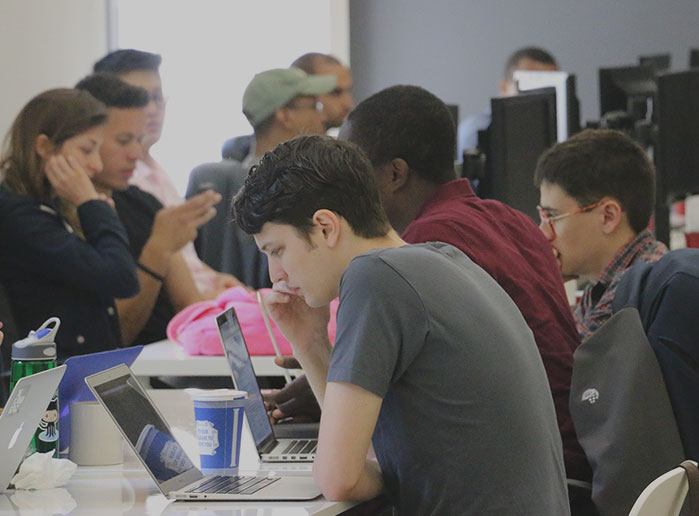Manuel Neuhauser started coding when he was still in middle school—so it’s no surprise he chose to major in Computer Science at North Carolina State University, getting both his bachelor’s and master’s degree in a five-year accelerated program.
But Manuel’s path took a slightly unconventional turn when he enrolled in Flatiron School’s 12-week immersive Web Development course in 2013. I spoke with Manuel about this decision, his current job, what he loves most about programming, and more.
Why did you decide to go to Flatiron?
I actually went to college for Computer Science and got both a bachelor’s and a master’s degree. But at that time, I was more interested in network security. After graduating, I worked at Cisco for five years. In the meantime, I was doing software development on the side.
I decided I want to be a full-time software developer—however, my background at Cisco didn’t help too much. So, I went to Flatiron to get real-world experience. I thought it would be fun to get up to speed with the startup scene in New York. And it was! Plus, Flatiron connected me to employers through its interview program placing graduates with different companies.
In short, I didn’t go to Flatiron because I didn’t know anything about programming. It was more about getting relevant experience and updating my resume.
What was your favorite aspect of learning at Flatiron?
I liked the environment—it felt communal. Like group study, to some extent. In the mornings we had class sessions, then we’d work on projects with other people. Some of my team members would know about a particular topic, or would have experience from the business side… Working in a varied team environment was really interesting. Up until that point, I’d only developed things on my own. I got to learn it wasn’t just about me anymore, I needed to listen to other people.
What kind of work do you do now?
I develop different products for Transparensee.com, a software development company. I’m building on the experience I gained at Flatiron, expanding on Ruby and JavaScript. It’s definitely a continued learning process for me.
What are you working on right now?
Right now we’re creating real estate platform that’s built on a bunch of micro-services. Most of them are written in Ruby, and now we’re getting to issues with scalability. So, we’re switching the Ruby code out for Go.
I have no Go experience, so I’m currently learning it. It’s fun, but kind of daunting because it’s new. I’m excited because I get to learn another language and another way of doing things.
How has your past work informed what you do now?
It helps in a lot of situations; because the company I work for is so small, our “DevOps” team is software developers. I have a strong background in networking and DevOps, which is really advantageous for me. Beyond my regular job as a software developer, I have broad experience and can bring a lot more to the table.
What’s your favorite thing about programming?
Solving issues in smart way. It’s not always easy, but if there’s a problem and you develop a fast, efficient, cool solution, you think, “Wow, I came up with this.” That challenge keeps me interested.
What was the biggest challenge you faced when you first started learning to code?
That’s hard to say because I was pretty much 10 years old when I started learning to code—I had a Windows computer with some basic documentation on it.
Honestly, I never had a hard time with anything. I was learning by doing. Whenever I encountered an obstacle, it made me want to go deeper.
I think if you’re passionate about something, you want to learn more. Take literature, for example—I could care less about it, so in my literature classes, I’d get frustrated. I didn’t care enough to want to dig in and figure out what the problem was. Whereas with something I really enjoy doing, like coding, nothing I encounter ever feels difficult.
Would you encourage other people to learn to code?
Definitely. And not just people in technical fields—it’s good for everyone to learn. I believe people should start learning how to program much earlier. In fact, I know Flatiron has programs for high school students.
Coding is really helpful—it teaches you a way to approach problems and try to solve them in a programmatic way.
Even if you just learn basic programming, maybe you’ll figure out it’s something you really like—and you’ll be the next Mark Zuckerberg and come up with something really cool. Or maybe it’s just something you learn, and it’ll be helpful in other areas of life.
If Manuel’s story inspires you to build your programming skills—whether you’re new to coding or a pro like Manuel—you can try Learn for free.
This post was written by Aja Frost, who covers business, tech, productivity, and careers.
Written byFLATIRON SCHOOL
Make yourself useful.

